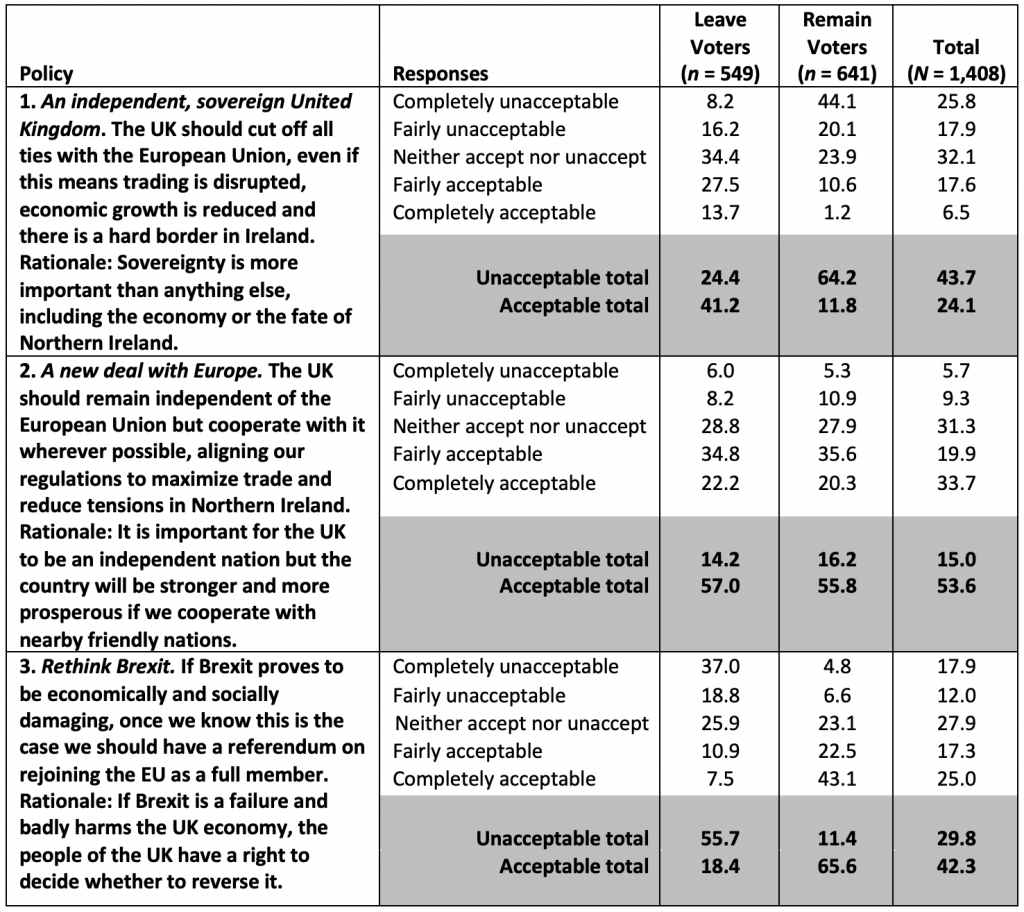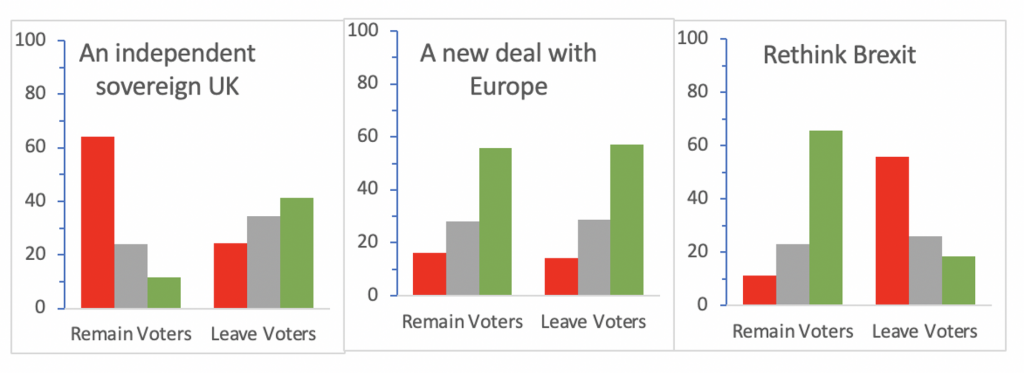Richard P Bentall, Paul Willner and Todd K. Hartman present findings from a recent survey measuring Leave and Remain identities, which also tested for how acceptable participants found specific policies aimed at Britain’s future relationship with Europe. They write that the policy of remaining outside the EU but seeking closer alignment with it is not toxic for people who had identified as either Leavers or Remainers.
With little hyperbole, Brexit remains a clear and present danger to the continued survival of the United Kingdom. Ever since the 2016 EU Referendum was first announced, this issue has infused British politics with turbulence, disagreement, and polarisation among political elites and the general public. Yet, there is no sign that the infighting will end any time soon, despite the fact the UK formally left the European Union in 2020.
The present Conservative government has only exacerbated matters by pursuing an ‘ultra-hard’ Brexit that alienates at least half of the UK population. Continuing along this path undermines the social and political coherence of the country, perhaps even fatally – it is not beyond imagination that Scotland could choose to become independent or that a new political settlement will emerge in Northern Ireland; support for Welsh independence has also increased since the referendum.
Brexit identities
Researchers have demonstrated that people form identities (i.e., how we define ourselves and internalise our group memberships) extraordinarily quickly. During political crises such as the English Civil War in the 17th century, for example, people divided themselves into Monarchists and Parliamentarians, even though there was little ideological difference between them (at least at the outset). Prior to Prohibition in the United States, citizens split into ‘drys’ and ‘wets’, and in the Dreyfus Affair in 19th century France, the public fractured into Dreyfusards and anti-Dreyfusards. In each case, the conflict lasted more than a decade, and bad feelings continued for long afterwards.
More recently, British people formed ‘leave’ and ‘remain’ identities surrounding the 2016 referendum that have persisted, and in many cases, may even be stronger determinants of political behaviour than traditional party affiliations. Although identities can be associated with self-esteem and resilience to mental ill-health, holding strong group identities can also be a source of conflict.
For instance, scholars have recently shown that Brexit identities are associated with out-group derogation – both Leavers and Remainers, for instance, think the other side is less intelligent, and they would be unhappy if their children were to marry someone of the opposing group. Moreover, Brexit identities appear to be associated with high levels of psychological distress. In a recent study, we discovered that people who identify strongly as either Leavers or Remainers score higher on clinical measures of depression and anxiety compared to those without strong Brexit identities.
Finding a way beyond Brexit (identities)
Recent polling reveals a remarkable stability of public opinion on the issue of Brexit, with roughly even splits on either side of the debate. However, a clear majority of the British public report dissatisfaction with the way that the issue is being handled and agree that ‘Brexit is going badly’. These results suggest that it may be possible to bridge the divide between Leavers and Remainers by finding a post-Brexit policy that provokes the least negative reaction amongst the maximum number of people. Stated differently, sensible politicians could seek policies that are unrelated to entrenched Leave and Remain identities, and thus avoid exacerbating further political conflict.
To explore potential ways forward, we conducted a nationally representative survey among the British public in December 2021 (more details about the C19PRC longitudinal study can be found here). In addition to measuring Leave and Remain identities, our survey included items designed to test different policies aimed at Britain’s future relationship with Europe. Rather than asking people whether they supported each policy, we instead asked participants about the acceptability of specific policies. The acceptability of three distinct post-Brexit policies are shown in Table 1, which tabulates responses for the whole sample, as well as by whether respondents had voted to leave or remain in the 2016 EU referendum.
Table 1: Acceptability of three potential post-Brexit policies to Leavers, Remainers and all voters
Source: C19PRC longitudinal study data.
The policy of ‘an independent, sovereign UK’ calling for a hard Brexit is highly unacceptable to 64% of Remain voters but also to 24% of Leave voters. Similarly, the policy named ‘rethink Brexit’ which advocates for a new referendum to re-join the EU shows the reverse pattern: it is unacceptable to 56% of Leave voters and even 11% of Remain voters. However, the policy of ‘a new deal with Europe’, which encourages cooperation and closer ties with Europe, is acceptable to both Leave and Remain voters, and it is only unacceptable to a small minority of voters of both types. This pattern can be seen more easily in Figure 1 (those who did or could not vote are excluded). Indeed, a better deal for Europe appears to be more acceptable to leave voters than a sovereign independent United Kingdom.
Figure 1: Percentage of Leave and Remain voters who find the three post-Brexit policies acceptable (green), unacceptable (red) or neither (grey)
Source: C19PRC longitudinal study data.
Can these findings be explained in terms of the way the policies relate to people’s identities? Support for ‘an independent sovereign Britain’ is strongly correlated with Leave identities (r = .56, p < .001), and negatively with Remain (r – .38, p < .001); the combination of both types of identity in a regression analysis accounted for 34% of the variation in support for this policy. Similarly, support for ‘rethinking Brexit’ correlated highly with Remain identities (r = .57, p < .001) and negatively with Leave (r = – .47, p < .001); combining both in a regression model accounted for 39% of support for the policy.
However, the findings for ‘a new deal with Europe’ were strikingly different. Support for this policy was entirely uncorrelated with either Remain (r = -. 03, p = .22) or Leave identities (r = – .02, p = .34), and combining both variables in a regression model failed to explain any of the variation in support for the policy. For readers who are uncomfortable with statistics, these findings can be simply restated as follows: the policy of remaining outside the EU but seeking closer alignment with it is not toxic for people who had identified as either Leavers or Remainers.
Final thoughts
Leave and remain identities are a crucial key to understanding the present mass psychology of Brexit and the continuing division and conflict over Britain’s future relationship with Europe. A political party that explicitly and vocally supported a new deal with Europe would likely benefit at the ballot box by support from both Leavers and Remainers. The only impediment to this policy at the moment would seem to be the unwillingness of politicians in either major party to advocate it, either because they have tied their fortunes to the ‘ultra-hard’ Brexit currently being pursued by the Conservative Party, or because they are too timid to make the case for a closer relationship with the EU without re-joining it. Perhaps a final conclusion is that Britain could be better served by its politicians if they just listened more carefully.
Note: This article originally appeared at our sister site, British Politics and Policy at LSE. It gives the views of the authors, not the position of EUROPP – European Politics and Policy or the London School of Economics. The first and second authors would like to state that they are members of the European Movement and have taken part in pro-EU campaigns. They hope this does not undermine their analysis of the data, which they have tried to carry out in an impartial way. The dataset will shortly be available on the C19PRC Open Science Framework website. Featured image credit: European Council








The impediment to a new, closer deal with Europe is not UK politicians or voters; it is the EU. When Theresa May tried to advocate it, she got a terrible deal, which is what led to the ‘harder’ Brexit that followed.
@Craig Jamieson nonsense she got the deal she asked for, you can’t keep all the benefits of being a full member of the EU and leave it at the same time, it was Britain’s choice to leave nobody forced us to leave, it seems to me that the Tory government wants to have their cake and eat it, and now Boris is threatening to tear up an agreement which he created breaking international law, but then he seems quite fond of breaking the law.
Interesting article which has broader implications that this most contentious of issues. Link psychology with politics to find a way to ways of operating successfully in a polarised and polarising environment. Those polarising opinion, emotionally, by appealing to identity seem to have a massive emotional advantage over the more rational and practical approach. Blair did some of this quite well, not appealing to the core labour believers and appealing cross party.
As a former MEP (1994 – 99) and an active member of Sheffield for Europe, the general view of our group is that we need to work slowly towards better alignment with the EU, as people in the UK realise more and more that what they were promised from Brexit is not materialising. Eventually we do want to fully re-join, while recognising we shall not get the privileges we did enjoy (opt-outs from the euro and Schengen, also the Thatcher rebate). Clearly we shall not want to be a rule-taker for ever, rather than contributing to making the rules in partnership with our fellow members. Working constructively with MEPS from other countries and political groups in our committees on how to make life better for all Europe’s nations was deeply satisfying.